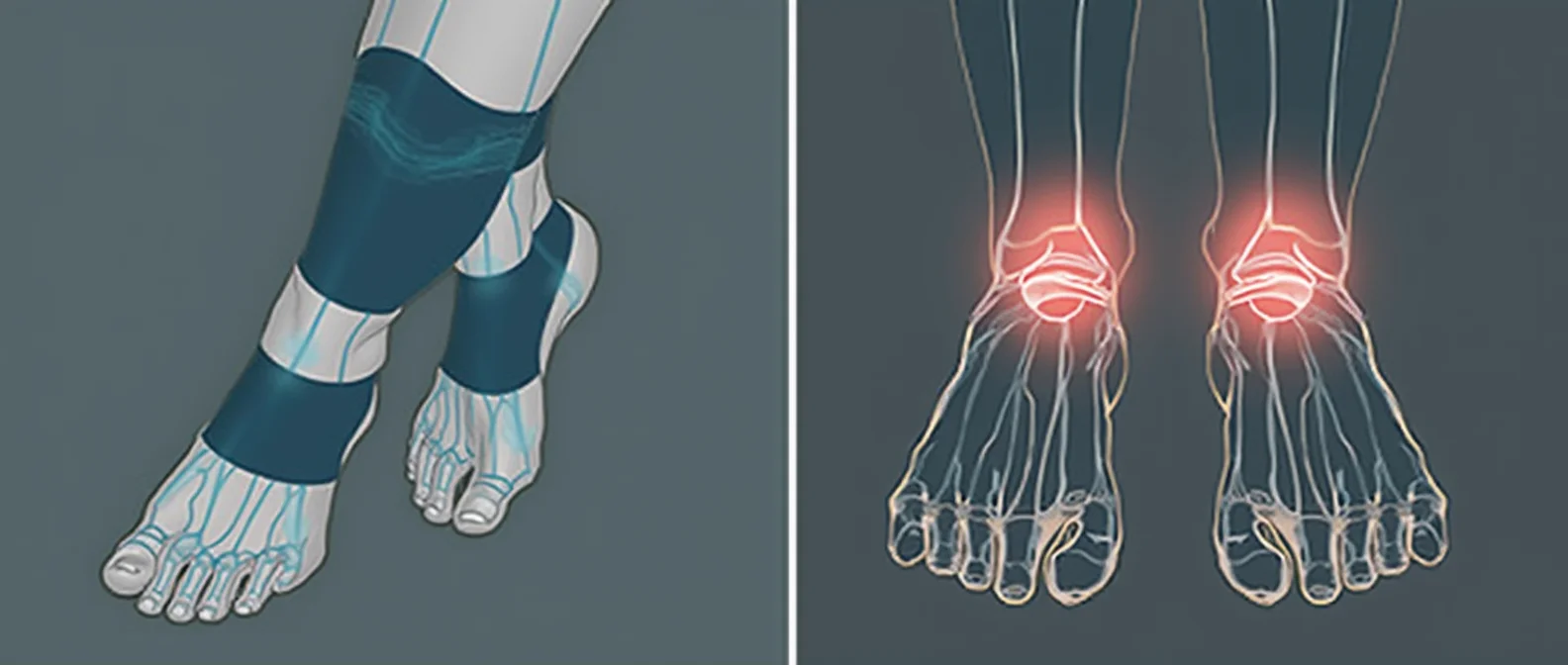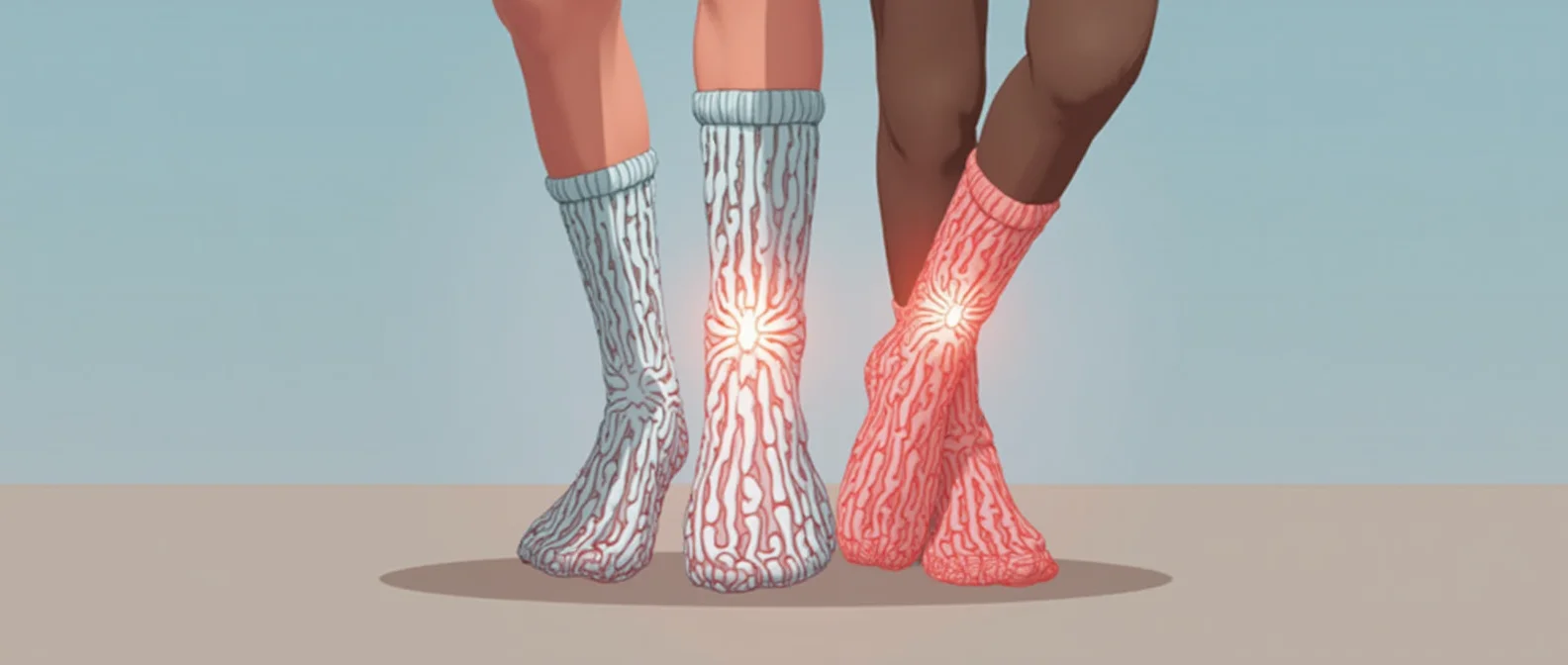Currently Empty: $0.00

Neuropathy is a condition that affects the nerves, often causing discomfort, numbness, or pain in areas like your hands, feet, and legs. If you’ve ever experienced tingling sensations, weakness, or shooting pain, you may be wondering what causes neuropathy. Understanding the triggers and risk factors of neuropathy is crucial to managing it effectively and preventing further complications. In this article, we’ll dive into the most common causes of neuropathy, the risk factors that increase your chances of developing it, and how you can protect your health.
Table of Contents
What Is Neuropathy?
Before diving into the causes and risk factors, it’s important to understand what neuropathy is. Neuropathy is a condition where the nerves in your body become damaged, leading to a variety of symptoms that can disrupt daily life.
Symptoms of Neuropathy
You may start noticing certain signs that indicate nerve damage. Common symptoms of neuropathy include:
- Tingling or “pins and needles” sensations in your hands or feet
- Numbness in extremities, especially the feet
- Muscle weakness, making it hard to move or grip things
- Pain, which may feel sharp, burning, or shooting
- Loss of coordination, affecting your balance and ability to walk
The symptoms of neuropathy can range from mild to severe, and they can affect the peripheral nerves, autonomic nerves, or even the focal nerves, depending on the type of neuropathy you have.
Types of Neuropathy
- Peripheral Neuropathy: The most common form, affecting the limbs.
- Autonomic Neuropathy: Affects the autonomic nerves, which control involuntary bodily functions like heart rate and digestion.
- Focal Neuropathy: Affects a specific nerve, often in the head, torso, or leg.
- Proximal Neuropathy: Affects nerves in the hips, thighs, or buttocks, causing weakness.
Now that you know what neuropathy is, let’s explore the factors that can cause or contribute to its development.

Common Triggers of Neuropathy
Several common triggers are responsible for the onset of neuropathy. By understanding these, you can be proactive in reducing your risk.
1. Diabetes
One of the leading causes of neuropathy is diabetes, especially when blood sugar levels are not well-managed. High blood sugar can damage blood vessels, leading to poor circulation and affecting nerve health. This condition is known as diabetic neuropathy, and it can affect nearly 50% of people with diabetes.
Key Points:
- Diabetes-related neuropathy usually affects the feet and legs first.
- Tight blood sugar control is essential to reduce the risk of nerve damage.
2. Alcoholism
Chronic alcohol consumption can also cause nerve damage. This is often referred to as alcoholic neuropathy, which develops due to the toxic effects of alcohol on your nerves. Excessive drinking can lead to nutritional deficiencies, particularly in vitamin B1 (thiamine), which is essential for nerve function.
Key Points:
- Alcoholism leads to both direct toxic effects on nerves and indirect effects like vitamin deficiencies.
- Reducing alcohol consumption can help prevent further nerve damage.
3. Vitamin Deficiencies
Nutrients like vitamins B12 and B1 are crucial for maintaining nerve health. A lack of these vitamins can impair nerve function, leading to neuropathy. For example, peripheral neuropathy often develops due to a B12 deficiency, causing symptoms like tingling and numbness in the hands and feet.
Key Points:
- B12 deficiency is one of the most common causes of neuropathy.
- Incorporating vitamin-rich foods like meat, eggs, and fortified cereals can prevent deficiencies.
4. Infections
Certain infections can trigger neuropathy. For example, shingles can cause a painful condition known as post-herpetic neuralgia. HIV, Lyme disease, and other viral or bacterial infections may also lead to nerve damage. When the body is fighting off infections, inflammation can affect the nerves and contribute to neuropathy.
Key Points:
- Neuropathy caused by infections often improves once the infection is treated.
- Early intervention and treatment of infections reduce the risk of nerve damage.
5. Autoimmune Diseases
Autoimmune diseases, where your body mistakenly attacks its own tissues, can also cause neuropathy. Conditions such as rheumatoid arthritis, lupus, and Guillain-Barré syndrome may lead to inflammation that damages nerves.
Key Points:
- Neuropathy caused by autoimmune diseases is often managed by controlling inflammation.
- Treatment for autoimmune diseases may help prevent or minimize nerve damage.
6. Chemotherapy
One of the most common side effects of chemotherapy is nerve damage, known as chemotherapy-induced peripheral neuropathy (CIPN). Chemotherapy drugs, while effective at treating cancer, can harm healthy nerve cells in the process.
Key Points:
- CIPN often affects the hands and feet, leading to tingling or numbness.
- Chemotherapy doses and the use of neuroprotective drugs can help manage this side effect.

Risk Factors for Developing Neuropathy
While certain conditions and triggers increase the risk of neuropathy, other factors can make you more vulnerable to nerve damage. Here are some common risk factors:
1. Age
As you age, your body becomes more susceptible to nerve damage. Older adults are at a higher risk of developing neuropathy, especially if they have underlying conditions such as diabetes or cardiovascular disease.
Key Points:
- People over 60 are at a higher risk of developing neuropathy.
- Regular health checkups and managing underlying conditions can help minimize the risks.
2. Genetics
Your family history plays a significant role in whether you develop neuropathy. Some types of neuropathy, such as hereditary neuropathies, are passed down through families. Conditions like Charcot-Marie-Tooth disease can cause nerve damage and are often genetic.
Key Points:
- A family history of neuropathy increases your chances of developing it.
- Knowing your family’s health history can help with early detection and prevention.
3. Obesity
Being overweight or obese can increase your risk of developing neuropathy, particularly diabetic neuropathy. Excess weight can lead to insulin resistance and elevated blood sugar, which can damage your nerves over time.
Key Points:
- Maintaining a healthy weight can reduce the risk of developing neuropathy.
- Regular exercise and a balanced diet are essential for managing weight and reducing nerve damage.
4. Poor Diet
A diet that lacks essential nutrients, particularly B vitamins and antioxidants, can impair nerve health. A deficiency in these vitamins can lead to nerve damage and increase the risk of neuropathy.
Key Points:
- A healthy, balanced diet with adequate vitamins and minerals is crucial for nerve health.
- Nutrient-rich foods like leafy greens, whole grains, and lean proteins can help protect against neuropathy.
5. Sedentary Lifestyle
A lack of physical activity can affect circulation and contribute to nerve damage. Regular exercise improves blood flow, which helps nourish your nerves and prevents complications such as peripheral neuropathy.
Key Points:
- Regular physical activity can help protect against nerve damage.
- A sedentary lifestyle increases the risk of neuropathy, especially when coupled with obesity or diabetes.

How Neuropathy Progresses
Understanding how neuropathy progresses can help you detect it early and take steps to manage the condition. Neuropathy generally develops in stages:
Stage 1: Initial Symptoms
At this stage, you may notice subtle symptoms, such as mild tingling or numbness in your hands or feet. These sensations might come and go, and you may not immediately associate them with nerve damage.
Stage 2: Progression
As the condition progresses, the symptoms become more pronounced. You may experience sharper pain, muscle weakness, and a reduced ability to perform everyday tasks. This stage often affects your mobility and balance.
Stage 3: Chronic Neuropathy
In the final stages, neuropathy becomes chronic, making it difficult to walk, grip objects, or manage daily activities. Nerve damage is typically permanent at this point, but pain and discomfort can be managed with medical interventions.
Prevention and Treatment Options
While neuropathy can be a challenging condition to manage, there are steps you can take to prevent it or slow its progression.
Lifestyle Changes
- Balanced Diet: Eating foods rich in B vitamins, antioxidants, and healthy fats can support nerve health.
- Exercise: Regular physical activity improves circulation and can prevent nerve damage.
- Avoid Alcohol: Limiting alcohol consumption reduces the risk of neuropathy, especially if you’re prone to it.
- Manage Underlying Conditions: Keeping diabetes, high blood pressure, and other risk factors in check can significantly reduce the risk of developing neuropathy.
Medical Treatments
- Medications: Pain relievers, antidepressants, and anticonvulsants are often used to treat neuropathy symptoms.
- Physical Therapy: Working with a physical therapist can help improve muscle strength, coordination, and balance.
- Alternative Therapies: Acupuncture, chiropractic care, and nerve stimulation therapies have shown promise in managing neuropathy symptoms.
Side Effects of Neuropathy
Neuropathy, particularly when left untreated or unmanaged, can lead to a range of side effects that affect both physical and emotional well-being. These side effects can vary depending on the type of neuropathy, its severity, and the nerves affected. Below are some of the most common side effects that people with neuropathy may experience:
1. Chronic Pain
One of the most debilitating side effects of neuropathy is chronic pain. The damaged nerves send abnormal signals to the brain, leading to sensations of burning, sharp, or stabbing pain. This pain is typically most noticeable in the hands, feet, or legs. For many, this pain can become a constant presence in their daily lives, making it difficult to focus on tasks or enjoy activities.
- Burning or shooting pain: Often described as a sharp, jabbing sensation.
- Sensitivity to touch: Even light touches, such as the feeling of clothing or bed sheets, can be painful for some.
2. Numbness and Tingling
Neuropathy often leads to numbness or a tingling sensation in the affected areas, especially in the hands and feet. This can make it difficult to sense temperature changes, pressure, or pain, increasing the risk of injury (e.g., cuts, burns, or falls). The tingling sensation, often referred to as “pins and needles,” can be constant or intermittent.
- Loss of sensation: As nerves become more damaged, you may lose the ability to feel certain parts of your body.
- Impaired coordination: Numbness and tingling in the feet can affect balance and coordination, making walking and standing difficult.
3. Muscle Weakness
When the motor nerves, which control muscle movement, are affected by neuropathy, it can lead to muscle weakness. This makes it challenging to perform simple tasks, such as holding objects, walking, or even standing for long periods. In some cases, muscle wasting can occur over time if the nerves are not functioning properly.
- Difficulty walking: Weakness in the legs can lead to unstable gait and increased risk of falls.
- Loss of grip strength: Weakness in the hands may affect your ability to hold items, turn knobs, or grasp objects.
4. Balance Problems
Neuropathy affecting the feet and legs can lead to balance problems. This is particularly dangerous as it increases the risk of falls and related injuries. Without proper nerve function, the brain may not receive accurate signals about body position, leading to coordination and balance issues.
- Frequent stumbling or tripping: Weakness and loss of sensation can impair your ability to maintain balance when walking.
- Difficulty standing for long periods: Prolonged standing may cause discomfort or unsteadiness.
5. Digestive Problems
When autonomic nerves, which control internal functions, are affected by neuropathy, it can disrupt the digestive system. This condition is known as autonomic neuropathy and can result in several digestive issues.
- Constipation: The intestines may not move food through the digestive system properly, leading to constipation.
- Nausea and vomiting: Nerve damage can interfere with the stomach’s ability to empty, causing nausea and vomiting.
- Bloating or indigestion: Difficulty digesting food can cause uncomfortable bloating, gas, or indigestion.
6. Heart and Blood Pressure Issues
Autonomic neuropathy can also affect the heart and blood vessels. Damage to the nerves that control heart rate and blood pressure can cause various cardiovascular symptoms.
- Rapid heart rate (tachycardia) or low blood pressure: This can cause dizziness, lightheadedness, or fainting, especially when standing up quickly.
- Irregular heartbeat (arrhythmia): Damage to heart-related nerves can result in abnormal heart rhythms.
7. Increased Risk of Injury
Nerve damage from neuropathy reduces your ability to feel pain, which can make you more prone to injuries. You may not notice small cuts, blisters, or burns until they become infected or worsen, leading to complications.
- Skin injuries: Due to reduced sensation in the feet or hands, you may not notice abrasions or wounds until they are severe.
- Infection risks: Unnoticed injuries can get infected, especially in people with diabetes-related neuropathy.
8. Sexual Dysfunction
In severe cases of neuropathy, particularly autonomic neuropathy, sexual dysfunction can occur. Nerve damage affecting the reproductive organs may lead to a decrease in sexual sensation and function.
- Erectile dysfunction: Men with neuropathy may experience difficulties maintaining an erection.
- Reduced sexual pleasure: Both men and women may experience decreased sensitivity and pleasure due to nerve damage.
9. Psychological Effects
Dealing with chronic neuropathy symptoms, such as pain, weakness, and loss of sensation, can lead to psychological side effects. Many people with neuropathy experience emotional distress, anxiety, and depression due to the constant physical discomfort and lifestyle limitations.
- Anxiety and depression: Chronic pain and disability can contribute to feelings of helplessness, depression, or anxiety.
- Sleep disturbances: The pain and discomfort caused by neuropathy often interfere with a person’s ability to get restful sleep, further exacerbating mental health concerns.
FAQ Section
What Causes Neuropathy?
Neuropathy can be caused by a variety of factors, including diabetes, alcoholism, vitamin deficiencies, infections, autoimmune diseases, and chemotherapy. High blood sugar levels, alcohol abuse, and a lack of essential nutrients can damage nerves, leading to neuropathy. Certain infections and autoimmune diseases can also cause inflammation that affects nerve health.
How Can I Prevent Neuropathy?
To prevent neuropathy, it’s important to manage underlying health conditions like diabetes and maintain a healthy lifestyle. Regular exercise, a balanced diet rich in vitamins and antioxidants, limiting alcohol consumption, and avoiding smoking can help protect your nerves. Additionally, keeping your weight in check and managing blood sugar levels are essential for reducing your risk.
What Are the Early Signs of Neuropathy?
Early signs of neuropathy include tingling, numbness, and pain in your hands and feet. These symptoms may come and go, and they can be mild at first. It’s important to recognize these early signs so that you can take steps to manage the condition before it progresses further.
Is Neuropathy Reversible?
Neuropathy is often not fully reversible, especially once nerve damage has occurred. However, early intervention can help slow down or even stop its progression. Treatments like pain management, physical therapy, and addressing underlying conditions can greatly improve your quality of life and minimize symptoms.
Can I Manage Neuropathy Without Medication?
Yes, neuropathy can often be managed without medication by making lifestyle changes, such as maintaining a healthy diet, exercising regularly, and avoiding alcohol. Alternative therapies like acupuncture and nerve stimulation may also help alleviate symptoms. However, some people may still require medications to manage pain and discomfort effectively.
When Should I See a Doctor About Neuropathy?
If you’re experiencing persistent or worsening symptoms such as numbness, tingling, or pain in your hands, feet, or legs, it’s important to see a doctor. Early diagnosis and treatment can prevent further nerve damage and improve your chances of managing the condition effectively.
Can Neuropathy Be Caused by Stress?
While stress itself is not a direct cause of neuropathy, chronic stress can contribute to conditions like diabetes, high blood pressure, and poor lifestyle choices, which may increase the risk of developing neuropathy. Managing stress through relaxation techniques and a healthy lifestyle can help reduce this risk.
Conclusion
Neuropathy can be a debilitating condition, but understanding what causes neuropathy and recognizing the risk factors early can help you take the right steps to manage it. By adopting a healthy lifestyle, managing underlying health conditions, and seeking medical treatment when needed, you can reduce your risk and improve your quality of life. If you’re experiencing symptoms of neuropathy,
You provide useful and clear content. Thank you for your efforts.
This article remains a trusted resource for many people who want to improve their daily comfort and manage the symptoms of neuropathy.



